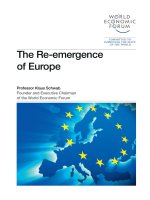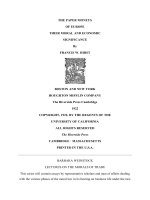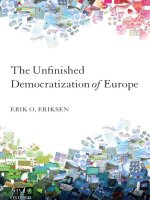- Trang chủ >>
- Khoa Học Tự Nhiên >>
- Vật lý
the unfinished democratization of europe nov 2009
Bạn đang xem bản rút gọn của tài liệu. Xem và tải ngay bản đầy đủ của tài liệu tại đây (1.19 MB, 286 trang )
THE UNFINISHED DEMOCRATIZATION
OF EUROPE
This page intentionally left blank
The Unfinished
Democratization
of Europe
ERIK O. ERIKSEN
1
3
Great Clarendon Street, Oxford ox2 6dp
Oxford University Press is a department of the University of Oxford.
It furthers the University’s objective of excellence in research, scholarship,
and education by publishing worldwide in
Oxford New York
Auckland Cape Town Dar es Salaam Hong Kong Karachi
Kuala Lumpur Madrid Melbourne Mexico City Nairobi
New Delhi Shanghai Taipei Toronto
With offices in
Argentina Austria Brazil Chile Czech Republic France Greece
Guatemala Hungary Italy Japan Poland Portugal Singapore
South Korea Switzerland Thailand Turkey Ukraine Vietnam
Oxford is a registered trade mark of Oxford University Press
in the UK and in certain other countries
Published in the United States
by Oxford University Press Inc., New York
# Erik O. Eriksen 2009
The moral rights of the author have been asserted
Database right Oxford University Press (maker)
First published 2009
All rights reserved. No part of this publication may be reproduced,
stored in a retrieval system, or transmitted, in any form or by any means,
without the prior permission in writing of Oxford University Press,
or as expressly permitted by law, or under terms agreed with the appropriate
reprographics rights organization. Enquiries concerning reproduction
outside the scope of the above should be sent to the Rights Department,
Oxford University Press, at the address above
You must not circulate this book in any other binding or cover
and you must impose the same condition on any acquirer
British Library Cataloguing in Publication Data
Data available
Library of Congress Cataloging in Publication Data
Library of Congress Control Number: 2009934136
Typeset by SPI Publisher Services, Pondicherry, India
Printed in Great Britain
on acid-free paper by
the MPG Books Group
ISBN 978–0–19–957251–9
13579108642
For Andreas, Ha
˚
kon, Henriette, and August
This page intentionally left blank
Preface and Acknowledgements
This book has had a long journey. It started in 2002 when we initiated the project
Citizenship and Democratic Legitimacy in the European Union (CIDEL) and was
carried on with the instituting of the RECON project in 2007.1 It is the result of
several years of work to come to grips with the fact that a new political order has
arisen in Europe, and one which has transformed the Westphalian order. For the
first time in human history, we witness the development of a political order that is
not based on a culturally homogenized people, or brought about by coercion and
brute force. The nature of the European Union is a large and contentious issue,
but nevertheless it is one which has brought to the fore the question of whether
post-national democracy is possible. Are we now witnessing the third transfor-
mation of democracy—to a post-national form—succeeding the transformations
to the city-state and to the nation state? Alas, the resources for such a move are
shallow at the European level and it is the member states that hold the means of
legitimate violence in reserve. The European Union (EU) is a polity that does not
itself have direct control of a given territory; it lacks a collective identity; truly
hierarchical principles of law and powerful enforcement means.
In order to know what is to be democratized one needs a grip on the nature of the
beast. But what does it entail to talk of democracy at the European level? Does it
imply establishing democratic institutions like the ones of the nation state? Does it
presuppose a European people, a nation or something less? Can there be constitu-
tions without a state and can there be democracy without it? The question is, in
other words, whether democracy really can be disassociated from its hierarchical,
nation-state foundation. To clarify such questions requires the joint effort of many
disciplines, as normative, legal, and socio-political aspects are interwoven.
Fortunately this has been much of a collaborative work and I have benefited
greatly from discussions, collaboration, and co-writing. I am grateful fo r all that I
have learnt from my colleagues at ARENA over the years and the networks I have
been taking part in. In particular, I am indebted to John Erik Fossum, with whom
I have cooperated for years, and who generously allowed me to reprint a co-
authored article (Chapter 4). I am grateful to Agustı
´
nJose
´
Mene
´
ndez who urged
me to take European law seriously, and to Helene Sjursen who made me aware of
the importance of the EU’s external dimension.
I am grateful to publishers for permission to reprint material from the following:
Chapter 3: ‘Deliberation und demokratische Legitimita
¨
tinderEU–Zwischen
Konsens und Kompromiss’, in Benjamin Herborth and Peter Niesen (eds), Anarchie
der kommunikativen Freiheit: Ju
¨
rgen Habermas und die Theorie der internationalen
Politik, (Frankfurt am Main: Surhkamp, 2007).
1 On the CIDEL project, see < on Reconstituting Democra
cy in Europe (RECON), see <> (both accessed 23 March 2009).
Chapter 4: ‘Europe in Search of Legitimacy: Strategies of Legitimation Assessed’,
International Political Science Review, 25/4 (2004): 435–59.
Chapter 5: ‘Why a Charter of Fundamental Human Rights in the EU?’, Ratio
Juris, 1/3 (2003): 352–73.
Chapter 6: ‘The EU–A Cosmopolitan Polity?’ Journal of European Public Policy,
1/2 (2006): 252–69.
Chapter 7: ‘An Emerging European Public Sphere’, European Journal of Social
Theor y, 8/3 (2005): 341–63.
Parts of this book have been presented in seminars and conferences, in Oslo,
Florence, London, Frankfurt, Chicago, Copenhagen, Stockholm, Madrid, Aalborg,
Austin, Berlin, Montreal, and Riga. A number of people have commented on
specific topics raised in this book, among them are Lars Blichner, James Bohman,
Hauke Brunkhorst, Damian Chalmers, Nicole Deitelhoff, Rainer Forst, Harald
Grimen, Daniel Gaus, Ju
¨
rgen Habermas, Kerstin Jacobsson, Christian Joerges,
Knud Erik Jørgensen, Marika Lerch, Anders Molander, Ju
¨
rgen Neyer, Johan
P. Olsen, Ulrich K. Preuss, Kolja Raube, Thomas Saretzki, Rainer Schmalz-Bruns,
Philip Schlesinger, Anne Elizabeth Stie, Hans-Jo
¨
rg Trenz, anonymous reviewers for
Oxford University Press, and Philippe C. Schmitter and Christopher Lord, who
commented critically on the penultimate version of the manuscript. The comments
I have received are immensely valuable although I am not sure to what degree I have
managed to satisfy my critical interlocutors.
In writing this book I have profited greatly from ARENA, which provides
resources also in the form of a stimulating research communit y. I would also
like to thank the Norwegian Research Council for financial support. I benefited
from being visiting professor at the London School of Economics and Political
Science winter/spring 2006. For superb technical as well as research assistance I
would like to thank Erik Ryen and Marit Eldholm. Without them, Geir Kværk
and the rest of the administrative staff at ARENA this work would not have been
possible. I am also grateful to Dominic Byatt for excellent backup. In particular I
am grateful to Helene for her persisting support at critical junctures of this book
project and for her continuous encouragements.
viii The Unfinished Democratization of Europe
Contents
List of Figures and Tables x
List of Abbreviations xi
1. Introduction: European Democracy in Transformation 1
PART I: THE DEMOCRATIC CHALLENGE
2. The Quest for Democratization 21
3. Democratic Legitimacy Through Deliberation? 37
PART II: ELEMENTS OF DEMOCRATIZATION
4. Europe: On the Search for its Legitimacy 57
5. Chartering Europe 85
6. The Cosmopolitan Dimension 102
7. A Layered European Public Sphere 119
PART III: WHAT KIND OF LEGITIMATE ORDER
8. Government or Transnational Governance? 155
9. A State-less Government 185
10. Parliamentary Democracy without a Demos 216
Finale: An Unaccomplished Post-national Democracy 229
Bibliography 233
Index 257
List of Figures
3.1 Typology of agreements 52
4.1 Integration on the basis of problem solving 63
4.2 Value based integration 67
4.3 Rights based integration 72
List of Tables
4.1 Three logics of integration 61
7.1 Typology of public spheres 131
9.1 Levels and dimensions of integration 203
List of Abbreviations
ASEAN Association of South East Asian Nations
CAP Common Agricultural Policy
CFI Court of First Instance
CFSP Common Foreign and Security Policy
COREPER Committee of Permanent Representatives
COSAC Conference of Community and European Affairs
Committees of Parliaments of the European Union
CT Constitutional Treaty
DiDeP Direct Deliberative Polyarchy
ECHR European Convention on Human Rights
ECJ European Court of Justice
ECSC European Coal and Steel Community
EEC European Economic Community
EP European Parliament
EPC European Political Cooperation
ESDP European Security and Defence Policy
ESS European Security Strategy
EU European Union
GATT General Agreement on Tariffs and Trade
GDP Gross Domestic Product
ICC International Criminal Court
IGC Intergovernmental Conference
IMF International Monetary Fund
MEP Member of the European Parliament
Mercosur Southern Common Market
NAFTA North American Free Trade Agreement
NATO North Atlantic Treaty Organization
OECD Organization for Economic Cooperation and Development
OMC Open Method of Coordination
OSCE Organization for Security and Cooperation in Europe
SEA Single European Act
TEC Treaty establishing the European Community
TEU Treaty on European Union
TFEU Treaty on the Functioning of the European Union
UN United Nations
WP White Paper
WTO World Trade Organization
xii Abbreviations
1
Introduction: European
Democracy in Transformation
The history of the European integration project is replete with conflict and
rivalry. Deadlocks and stalemates have however be en overcome and it has sus-
tained a rapid growth and development, in particular throughout the 1990s. The
European integration process is characterized by histo rians as revoluti onary,1 but
is not universally embraced. Critique flourishes and support of the European
Union (EU) has been declining in parts of Europe. Disagreement stems from
different conceptions of the EU qua polit y; different conceptions of the nature
and direction of the integration process; and different conceptions of democratic
legitimacy. Notwithsta nding recent confusion and disagreement about its nature
and telos, the EU has developed into a political union with extensive competen-
cies and powers. A political order that is distinct from its constituent parts has
arisen, one which has transformed the Westphalian truism of sovereignty. Classi-
cal international law guaranteed the equal status of sovereign states and the state’s
independence from outside intrusion. In Europe the nation-states have managed
to domesticate international relations among themselves. By institutionalizing
supranational dispute mechanisms, a pacific settlement of conflicts is enforced.
Today war seems unthinkable among the large European states.
The European integration project was a reaction to a belligerent past. It
originated in the ruins of the Second World War, aiming at ending nationalist
aggression and inter-state war. From the very outset this was a normative project
about the (self) containment of Germany, ending war in Europe, achieving
stability and peaceful coexistence. This project has resulted in a new political
order without historical precedent, and one which has committed itself to
democracy. The European Union has embraced democratic principles, yet it
falls short of fulfilling these principles itself; hence the democratic deficit. This
problem is not confined to the institutional arrangement at the European level as
the EU is a complex multi-level entity that impinges on the democratic character
and performance of the member states and even on affiliated non-members. This
means that we cannot establish the member states’ democratic legitimacy without
properly taking the effects of the EU into account.
This book deals with the puzzle that democracy, which hitherto has existed only
on the nation-state level, now is exp ected of the EU to appear in a post-national
1 See Hitchock 2003: 436. See also Judt 2005.
union. What does this mean in theoretical terms, can it be realized at all, and if so,
how far has European integration proceeded along this developmental path? The
book purports to contribute to democratic theory under conditions of globaliza-
tion and intensive interdependence as well as to the understanding of the EU from a
democratic point of view. The EU is the most advanced experiment in democracy
beyond the nation-state, and one whi ch challenges widely held assumptions about
the preconditions for democracy.
The debate on supranational democracy in Europe hinges on the fact that there is
something to legitimize, that is, that the EU is not merely an intergovernmental
organization controlled by the nation-states. The EU at present consists of twenty-
seven member states and influences states and citizens directly. The overall claim in
this book is that the EU can no longer be understood as an international organiza-
tion whose legitimacy derives solely from the member states but should be seen
instead as a polity in its own right with direct links tothe citizens. The topicality of the
question as to whether there can be democracy beyond the nation-state is sharpened
by the fact that Europeanization and globalization are frequently held to undermine
national democracy. But can post-national democracy be realized at all?
It goes without saying that democracy is always unfinished. It is a contested
concept and an ideal that can never be fully realized. We can therefore only talk
about democratization of established power structures as a measure of democracy.
Thus, the end product is not democracy tout court but a state of affairs that
complies better with proper standards than the present state of affairs in Europe.
By democratization we generally mean curtailing the level of domination in
society and increasing the possibilities for collective self-determination. In line
with the theory of deliberative democracy, democratization is here further spe-
cified to mean increasing the possibilities for offering the citizens justifications for
the power structures they are subjected to.
In this introduction, I will start by spelling out some of the supranational
aspects of the multi-level constellation that makes up the European Union, which
distinguish it from an ordinary international organization. Then, I outline the
presumption about democracy as the legitimation principle of power and discuss
why constitutionalism rather than state sovereignty comes to the fore in a post-
Westphalian order. Thereafter I revisit the debate on European democracy, which
I group into three different positions. Lastly, I present an overview of the chapters
making up the rest of the book.
BEYOND SIMPLE INTERGOVERNMENTALISM
The new political order was brought about in a cooperative and voluntary manner
and through the means of enhanced economic collaboration. Starting with the
Coal and Steel Community (ECSC) in 1952 between Germany, France, Italy, and
the Benelux countries, it has emerged into a forceful political entity. This was the
first time powers were delegated to a supranational organization—the High
2 The Unfinished Democratization of Europe
Authority, which later became the powerful European Commission—that took
hold over a policy area of vital interest to the nation-states. Coal and steel are what
weapons are made from and should therefore be reciprocally controlled. Or as the
Schuman declaration (1950) put it:
By pooling basic production and by instituting a new High Authority, whose
decisions will bind France, Germany and other member countries, this proposal
will lead to the realization of the first concrete foundation of a European
federation indispensable to the preservation of peace.
European integration was brought about by bold initiatives from committed
European leaders and supported by stakeholders in different countries. In one
perspective it has been an elite-led project, and one confined to cooperation in
areas of mutual interest. Conflicts with regard to the expansion of the Commu-
nities’ competences were resolved through complex rounds of bargaining at
Intergovernmental Conferences (IGCs). At late hours and in closed-doors set-
tings deals were made and bargains struck on Treaty changes.
In another perspective, the focus is on Community-established institutions
and procedures for identifying and solving common problems on their own.
Autonomous cooperation freed from political bargains and political struggle for
power has also been a conspicuous feature of the European integration process,
creating a basis for increased understanding, more compromises and progress.
Trust and faith in the integration process, which has been fostered through
continuous contact and cooperation in more or less independent problem-
solving sites, has prepared the way for new initiatives—for further deepening:
from the Paris (1951) and Rome (1957) Treaties, through the Single European Act
(SEA) (1986), Maastricht (1992) and Amsterdam (1997) to the Nice Treaty
(2001), and further to the Laeken Declaration (2001), the rejected Treaty estab-
lishing a Constitution for Europe (2004) and the ensuing Lisbon Treaty (2007).
Through these processes of steadily firmer and more institutionalized forms of
cooperation, the European nation-states have been transformed. They have been
‘Europeanized’. The nation-states have voluntarily circumscribed their sovereign-
ty and reduced their autonomy. In many areas the nation-states have surrendered
their veto powers.2 As noted by the European Court of Justice (ECJ):
By creating a community of unlimited duration, having its own institutions, its
own personality, its own legal capacity of representation on the international
plane and, more particularly, real powers stemming from a limitation of sover
eignty or a transfer of powers from the states to the Community, the Member
States have limited their soverign rights and have thus created a body of law
which binds both their nationals and themselves.3
2 They have accepted restrictions on their sovereignty not only for the sake of cooperation with
other states but also for the establishment of a ‘legal system of peace and justice between nations’ as it
is stated in the Italian Constitution, Article 11. Other European states’ constitutions contain similar
paragraphs.
3 Case 6/64, Costa v Enel.
Introduction: European Democracy in Transformation 3
The supranational character of the legal structure of the EU started with the
acceptance of a constitutional reading of the founding treaties, already in the
1950s, and explicitly in the 1960s,4 which transformed the European Economic
Community (EEC) from an international regime into a quasi-federal legal system
based on the precepts of higher-law constitutionalism. This was generated by the
ECJ in the combined doctrines of direct effect, which affirms the full legal
character, under certain conditions, of EC norms; and supremacy of Union law,
stating that national norms must give way to Community ones when an irreduc-
ible conflict arises within the scope of application of the Treaties. This has been
coupled with the growth of the number of EU provisions and Court rulings,
where the Court acts as a trustee of the Treaty and not as an agent of the member
states. The EU appears to have reached a stable political form based on a material
constitution (Mene
´
ndez 2004).
The upshot is that European citizens are subjected to decisions that have not
been decided unanimously among the states but by qualified majority vote in the
Council. A state rights clause is non-existent in the Treaties. In its place there is a
subsidiarit y clause claiming that ‘decisions are taken as closely as possible to the
citizen’, with little legal bite (Somek 2008). Slowly, the European Community
emerged into a supranational organization with legal personality and a legal
system based on the precepts of higher-law constitutionalism. It has materialized
into a polity in its own rig ht and one with a democratic vocation.
Democracy came to the fullest expression through the decision in 1976 to elect
the representatives of the European Parliament (EP) by direct universal suffrage,
making it the only genuinely supranational parliament in the world. Further, the
Treaty of Maastricht established European Union citizenship, and this as well as
other individual rights make up critical components of democracy as self-legisla-
tion. In the Amsterdam Treaty, the commitment to democracy was entrenched. The
EU is more than an international organization forged on the basis of the mutual
interests of the member states. It is also inadequate to see the process of conflict
resolution solely as a result of threat-based bargaining, because how can unequally
situated governments, each in pursuit of its own self-interest, bargain rationally with
one another, and yet arrive at a system with some form of democratic imprint? The
EU, unlike an international organization, carries out its affairs not through diplo-
macy and crude bargaining, but through a set of institutions and procedures. The
European Treaties have the function of a constitution as they establish both a unitary
European citizenry distinct from national ones and a set of autonomous European
bodies: the European Commission, the European Council, the Council of the
European Union, the European Court of Justice and the European Parliament,
which make European-wide law and are devoted to the Union itself.
The system is endowed with an authoritative dispute resolution mechanism—
the ECJ, which bases its rulings on recognition of the primacy of Union law. The
4 See the leading cases: 26/62 Van Gend en Loos and 6/64 Costa v Enel. On the supranational
character of EC law, see Weiler 1999a; Alter 2001; Stone Sweet 2004.
4 The Unfinished Democratization of Europe
EU is, thus, an entity with competences and capabilities of its own. Moreover, it
has in recent years undertaken steps to reduce its democratic deficit. All legal
persons, and not only states, have judicially enforceable rights, and legitimacy
established through domestic channels, through national democracy, has been
supplemented with direct channels of influence. The European Parliament has
obtained more power and majority vote has replaced unanimity as the means of
arriving at decisions in the Council in most policy fields. Moreover, the Charter of
Fundamental Rights of the European Union (2000), as consolidation of existing
law, applies to all citizens of Europe and strengthens the protection of the citizens
at the supranational level. Hence, the EU is a Union both of states and of citizens.
The European Union is a novel type of entity whose principled and constitu-
tional status is ambiguous and incomplete and whose underly ing telos is not
clear. It is burdened with legitimacy deficits with regard to structure, process and
project. Structural problems refer to the EU’s weakly developed legislative struc-
tures, including the lack of European political parties, a proper public sphere, a
cumbersome and executive-driven policy process, and an ‘incomplete’ constitu-
tional arrangement imbued with an inadequate separation of branches of powers.
The process of integration is widely criticized, although the critics often do not
agree, nor do they emphasize the same problems. For instance, some critics are
concerned with costs and efficiency, others with technocracy and lack of popular
participation and due process, and yet others with the absence of a sense of
community and identity. Also as a project the EU is criticized. Is it a good idea,
what are its merits and whose interests does it serve? Some denounce the EU for
its lack of ambition, others for its overly strong ambition. In the member states,
many are sceptical concerning the Union’s policies. This distrust is manifest not
only in the low turnout in the elections to the European Parliament, but also in
the loudly voiced opposition of anti-modernization and anti-globalization groups.
Such scepticism was revealed in the popular rejections of the Constitutional Treaty
(CT) in France and the Netherlands in 2005 and of the ensuing Lisbon Treaty in
Ireland in 2008. With the treaty-reform process coming to a halt, many commenta-
tors have been prompt to assert that the European Union is in crisis. This stands in
stark contrast to the euphoria with regard to the 2004 enlargement of the Union to
ten new countries from the East and the South and with regard to the Constitutional
Treaty signing ceremony in Rome later the same year.
IN SEARCH OF JUSTIFICATION
The problem of the legitimacy deficit of the EU raises the question of the nature
of the entity, which values it promotes and how it can be justifi ed. In this book,
I start from the premise that the EU exists as a powerful entity; it is a system that
makes authoritatively binding decisions and exerts influence over its subjects.
Such an order of dominance is in need of justification. In particular, it requires a
set of procedural norms through which legitimacy can be claimed and contested.
Introduction: European Democracy in Transformation 5
I am not concerned with why the EU is, or whether it should be, in place. Rather,
given the fact that it has been brought into existence and affects the interests and
identities of European citizens and states in a profound manner, the question is
whether it can achieve legitimacy, and on what grounds. A European basic
structure exists—with economic, political, legal, and cultural institutions involv-
ing citizens in comprehensive schemes of social cooperation, the effects of which
are far-reaching and for the most part unchosen by the people.
The point of departure is that the EU is a large-scale experiment searching for
binding constitutional principles and institutional arrangements beyond the
mode of rule entrenched in the nation-state. State power is being domesticated by
supranational law, and the only possible legitimacy basis for this law, I contend,
comes from the constitutional developments in Europe that emerged in the wake
of the French Revolution, and which for more than 200 years now have con-
tributed massively to both the creation and stabilization of nation-states. It was in
The French Declaration of the Rights of Man and Citizen (1789) that for the first
time the me mbers of a European polity were conceived of as social and political
equals. In the republican tradition constitutions are arrangements for respecting
the equality and the freedom of the individual in the realization of the idea of
popular self-government; or as it is stated in }6 of the same declaration:
Law is the expression of the general will; all citizens have the right to concur
personally, or through their representatives, in its formation; it must be the same
for all, whether it protects or punishes.
The argument in this book is that it is this notion of a democratic sovereign—a
self-governing polity—that animates the criticism of the integration process, the
accusation of an elitist and technocratic driven process, as well as many of the
reforms undertaken to meet the criticism. In democratic states there is a pre-
sumed link between the normative validity of a political order and the social
acceptance of this order. One therefore can expect that when integration has
reached a point where the supranational institutions wield influence over the
citizens and the states—when the EU is not merely an international organiza-
tion—there is a requirement of democracy because this is the only justifiable
standard of political legitimation available in Europe.
I make two claims. First, that democracy (however understood) is the only
morally sound principle for the legitimation of political domination. The EU
needs legitimation and such can be accomplished only through institutionalizing
democratic rights and procedures through which the addressees of the laws can
exert influence and put decision-makers to account. At a minimum these entail
equal political rights, civil liberties, freedom of expression, and principles for
accountability. Second, that the reform processes of the Union testify to the
emergence of a post-national union with democratic features. The latter is a
contentious claim that needs further empirical investigation to be corroborated.
My argument is that the political system of domination already in place at the
European level requires and aspires to direct legitimation—from the citizens
6 The Unfinished Democratization of Europe
themselves; and not only indirect—derived from the member states. This can be
achieved only by making the EU into a democratic polity.
In particular since the establishment of a directly elected European Parliament
in 1979, and after the hard-won referenda over the Maastricht Treaty in the early
1990s, we have witnessed a reform process oriented towards repairing the demo-
cratic deficit of the Union. Two conspicuous traits stand out. First, the Charter of
Fundamental Rights of the European Union, proclaimed at the Nice IGC in
December 2000. The Charter, which made up Part II of the Constitutional Treaty,
is in the Lisbon Treaty replaced by a cross reference, which makes the Charter
binding and gives it the same legal value as the Treaties.5 The Charter of
Fundamental Rights lends credence to the notion of the EU as an organization
of legal consociates rather than a market. Second, the decision to establish the
Convention on the Future of Europe at the Laeken Summit (European Council
2001a), later dubbed the Constitutional Convention, which drafted the Constitu-
tional Treaty (ratified in eighteen member states6 but rejected in the two popular
referenda in France and the Netherlands).7 The ensuing Lisbon Treaty is at the
time of writing in limbo after be ing rejected in an Irish referendum in 2008, but
expected to come into force in 2010. These two developments are the most
important signs that the EU is involved in democratic constitution-making.
One may however ask whether democracy is at all possible beyond the nation-
state. Are the resources in the form of a uniformity of interests that Tocqueville
(1835–40) required; the mutual sympathy among the populations that John Stuart
Mill (1861) saw as a condition; the ‘reflexive homogeneity’ that Claus Offe (2003a)
holds to be intrinsically linked to democracy, available at the European level? Or
are they at all necessary for post-national democracy? To this date, democ racy has
relied on criteria that are derived from the nation-state. As there are global and
post-national forms of governance, there may be a need for a conception of
democracy that is decoupled from the nation-state model.
THE MYTH OF WESTPHALIA
International organizations occupy an uneasy place in democratic theory. Can
such entities develop into democratic organizations, or will they affect established
political institutions and identities adversely? The process of European integration
5 Article 6.1 Treaty on European Union (TEU), as amended by the Lisbon Treaty (Official Journal C 115
of 9 May 2008). A Protoc ol introduces sp ecific measures for the UK and Poland s e eking to esta blish
national exceptions to the justiciability of the Charter: ‘Protocol on the application of the Charter of
Fundamental Rights to Poland and to the United Kingdom’. See further Chapters 4 and 5 on t h is.
6 In or der of ratification dat e: Lit h uania, Hungary, Slovenia, Italy, Gr eece, Slovak Republic, Spain,
Austria, Germany, La tvia, Cyprus, Malta, Luxembourg, Belgium, Estonia, Finland, Bulgaria, and Romania.
7 In the French referendum, held on 31 May 2005, 55 per cent of the voters said ‘no’ to ratifying the
Constitutional Treaty. In the Netherlands, a consultative referendum was held on 1 June 2005, in which
it was rejected by 61.5 per cent of the Dutch voters.
Introduction: European Democracy in Transformation 7
is spurred by intense mutual interdependence, and is linked to processes
of globalization and denationalization that pose problems for national democracy.
Economic globalization implies that decisions are increasingly made in con texts
well beyond national control, and the range of policy options available to national
decision-makers is greatly narrowed. In a globalized context, the scope of
social organization no longer appears to coincide with national territorial bound-
aries. Trans-border problems such as capital flight, tax evasion, volatile global
financial markets, large-scale population movements, pollution and the like
are beyond the reach of nation-state capability. Increasingly, political bodies
beyond the nation-state are required to cope with this new problem scenario
as well as to curtail arbitrary power. The present delegation of powers to external
organizations and the law production in international bodies leads to juridifica-
tion, technocratic governance, and executive dominance. These problems are gener-
ally associated not only with globalization but with the European integration
process as well, which, however, can also be seen as an effort to catch up with
them politically.
Is there any possibility for bringing the common will of the peoples of Europe
to bear upon EU decision-makers? Under the established conditions of interde-
pendence, cooperation and institutional responsibility it is difficult to meet the
democratic claim that decisions should be either made through a process inclu-
sive of all those who are affected by them, or acceptable to all those who are
affected. It is hard to achieve full political equality in an international context.
On the other hand, if political communities are no longer only national, the
idea of self-government needs to be rethought. Today, the process of globalization
is helping to bring forth the emergence of a transnational communit y and new
forms of governance above (as well as below) the state. It is of interest to explore
what notions of legitimacy and capability such forms are based on, and whether
they do contribute to democracy beyond the nation-state.
European integration is a process in motion, and the EU is an unsettled order.
Jacques Delors once called it un objet politique non-identifie
´
. The EU provides us
with an experimentarium for testing alternative ideas of legitimate rule beyond the
nation-state. In Europe the political community is no longer merely statal or
national, the sovereignty of the states no longer (if it ever was) absolute and
undivided. The EU has pooled sovereignty within a territory that it does not fully
control. These developments have come to reflect a multi-dimensional and disag-
gregated conception of sovereignty and a move beyond the Westphalian order, that
is an order in which states are held to be sovereign with fixed territorial boundaries
and entitled to conduct their internal and external affairs autonomously, without
any possibilities for external actors to control the protection of human rights.8
8 Sovereignty may take different forms, but the classical doctrine states that ‘first, no one can be the
subject of more than one sovereign, second, only one sovereign power can prevail within a territory,
third, all citizens possess the same status and rights, and fourth, the bond between citizen and
sovereign excludes the alien’ (Linklater 1996: 95).
8 The Unfinished Democratization of Europe
In this order the international society is in a state of anarchy in the sense that there
is no higher authority to appeal to. Anarchy is limited and organized, as it is a legally
sanctioned attribute of the states system. A further presumption is however that
sovereignty is not simply a legal status; it is also a description of state power: states
control the main levers of power and have the capacity to exercise territorial control
within the legal, economic, and cultural realms. In this sense ‘anarchy is what states
make of it’ (Wendt 1992). Deals will be struck that reflect the asymmetrical power
relations in the international sphere of states, hence the prevalence of threat-based
bargaining with the accompanying characteristics of side-payments, horse-trading
and package deals. Within the European setting, where state power varies consider-
ably, no single state is strong enough to enforce its will. Systematic change has
occurred in the political order of Europe, moving beyond Westphalia (Ruggie 1993).
One should, however, realize, as already Hegel (1821) and Carl Schmitt (2003: 167)
did, that state sovereignty was never absolute, not even in its most Hobbesian
moments; it rests on shared political norms and mutual recognition and on institu-
tionalized procedures for conflict resolution between the states. From this perspec-
tive constitutionalism, rather than state sovereignty comes to the fore.
This is more so as legal developments over the last half-century have been
remarkable, and one of their main thrusts has been to protect human rights, moving
classical international law in the direction of cosmopolitan law. The development of
the United Nations (UN) (and regional entities such as the European Convention
on Human Rights), whose global entrenchment has been re-enforced through
multilateral arrangements for regulating economic international affairs (such as
the World Bank Group, GATT, IMF, and the WTO), and their accompanying set of
institutions, first delimited, and later redefined, the principle of state sovereignty.
Aggressors can now in principle be tried for crimes against humanity, and offensive
wars are criminalized. Thus, international law may have changed so that state
sovereignty has become conditional upon citizens’ sovereignty. Staatsra
¨
son is no
longer the sole priority, as the individual has become the state’s raison d’e
ˆ
tre.Onthis
background, advocates of cosmopolitan democracy challenge the notion of sover-
eignty and, drawing on the work of Hans Kelsen (1920, 1944) and others, have
argued to replace the concept of sovereignty at all levels with constitutionalism.
The mentioned remarkable legal developments have been hard toaccount for and
the implications have toa large degree gone unnoticed. The myth of the Westphalian
order prevails,9 and not only in the (much taken for granted) template of interna-
tional relations (Osiander 2001), but also in the methodological nationalism of the
social sciences in general (Beck 2003).There is need for theoretical innovation in
order to grasp and account for the underlying normative order of the ‘system
of states’ as well as the developmental path towards cosmopolitization. By this is
meant not only trends towards a constitutionalized world order but also the
inclusion of universal categories—human rights clauses—in national constitutions.
9 See Kelsen 1920. For another take on the myth of state orders, as symbolic orders, see Cassirer
1946.
Introduction: European Democracy in Transformation 9
First of all there is a need for reassessing sovereignty. Nominally, it depicts the
legal capacity to act on common action norms independently and ‘the right to
issue orders backed by threats which are generally obeyed’ (Hart 1997: 25). It is a
principle stating that an order is free if it is not dominated by others, but it does
not any longer depict the status of territorially limited absolute powers. It is an
ordering principle of international affairs, as well as a status and a set of rights
and privileges (Morgan 2005: 139). However, increasingly it has been legally
circumscribed and embedded in a normati ve structure of mutual recognition.
A state does not cease to be sovereign even if it has delegated certain of its rights,
powers and privileges to a supranational order whose decisions it cannot veto;
but a state can reach a point wherein it has delegated so much that other states no
longer regard it as a sovereign state. In Europe, borders are not absolute barriers,
state sovereignty is pooled and delegated, constrained and transformed (Jackson
2000: 346), and the dividing line between domestic and foreign politics is blurred.
Secondly, there is a need for theoretical innovation with regard to accounting
for these processes in empirical terms. What notions of agency, of rationality and
legitimacy, are required? Max Weber (1946: 280) stated that interests can only
be realized as far as they are connected to justificatory ideas, and ideas can only be
realized as far as they are connected to existing interests. We need to know what
kind of competence and skills, and what social, moral, and cultural resources
made the European development possible. A European identity, which could
make up the common value base required for effective collective decision-making
of a post-national sovereign, is feeble. Is democracy then possible at the European
level? Can it be disassociated from its putative nation-state foundation? Is it true
that without the ‘enabling condition of sovereignty’—with ‘some form of law,
with the centralized authority to determine the rules and a centralized monopoly
of power of enforcement’—there can be no justice (Nagel 2005: 116)?
EUROPEAN DEMOCRACY REVISITED
There are different solutions as to how E ur ope c ould handle interdependence among
the states a nd the putative democratic deficit of the emerging order.10 Three positions
that cut across ideologies and academic disciplines can be discerned.11 The first,
most dominant, takes as its key premise that the nation-state is the container of
democracy. The challenge facing proponents of national democracy is th at in today’s
10 On this debate see also Majone 1998 and Moravcsik 2002, who contend there is no deficit.
According to Moravcsik (2002: 605), ‘Constitutional checks and balances, indirect democratic control
via national governments, and the increasing control of the European Parliament are sufficient to
ensure that EU policy making is, in nearly all cases, clean, transparent, effective and politically
responsive to the demands of European citizens.’ For a rejoinder, see Bellamy 2006; Culpepper and
Fung 2007; Føllesdal and Hix 2006; Kaina and Karolewski 2007; Scha
¨
fer 2006. See also Schmitter 2000.
11 This section draws on Eriksen and Fossum 2008.
10 The Unfinished Democratization of Europe
Eur ope, a range of processes generally labelled under the heading of globalization are
seen to undermine the salience of the nation-state as the embodiment of democratic
government. Conservative Eurosceptics see European political integration as syn-
onymous with the factors that drain out the essence of nationhood.12 Social demo-
crats and communitarians claim that the European integration process sustains a
neo-liberal supranational order, an order that undercuts both the systems of risk
regulation and the measures of solidarity that were such characteristic traits of the
European welfare state.13 Taken together, these factors are s een to sustain a system of
multi-tiered democratic deficits. Many students of democracy go further and argue
that the democratic deficit is not merely a contingent matter relating to the effects of
globalization, but refers to a lack of core civic democratic components such as a
common European public sphere (Grimm 2004). Some underline the structural
character of the problem: it highlights built-in limitations in the scale of representa-
tive democracy. Robert A. Dahl (1999), for instance, has argued that, beyond a
certain scale representative democracy cannot work; thus, extending representative
democracy to the European level lengthens the democratic chain of legitimation and
heightens citizens’ alienation. T he most obvious solution is to roll back integration.
But can the rolling back of European integration rescue national democra c y under
conditions of interdependence and globalization? The merit of this solution is
disputed by other analysts who argue that the main challenge to national democracy
does not emanate from European integration, but instead from decisional exclusion as
a result of denationalization and globalization. Dahl’s argument about a ‘reasonable
threshold’ of s ize can als o be countered:
the right size of the republic is not clear as the American federalists already
recognized;
the current interdependent international affairs subject the individuals to
foreign decision-making;
with the deprivation of any form of direct international representation ‘the
relative weight of each individual’s vote should be even more severely discounted’
(Marchetti 2006: 302); and
public deliberation and the mediation of participation through various public
spheres may outweigh the loss of direct influence (Bohm an 2005: 33).
Many of the decisions affecting national citizens are made elsew here; or the
necessary collective decisions are not made at all. Indeed, these processes reveal
decreasing steering capaciti es on the part of the nation-state.14 When framed in
12 For a selection of Eurosceptical writings, see M. Holmes 1996. See also the special issues of
European Union Politics on ‘What Drives Euroskepticism?’ (Hooghe 2007) and of Acta Politica on
‘Understanding Euroscepticism’ (Hooghe and Marks 2007).
13 See Greven 2000; Miller 1995; Offe 2000, 2003a; Scharpf 1999; Streek 2000. Siedentop (2000)
gives this argument a special twist. Whilst supporting a European federal state, he argues that the
present integration process is an unhappy marriage of French e
´
tatisme and neo liberal economism.
This mixture threatens to undercut the prospect for democracy in Europe.
14 See Nielsen 2004. Bartolini (2004) sees this in the weakened power of centres’ ability to control
peripheries. Against this view we find analysts who argue that European integration strengthens the
state. See, notably, Moravcsik 1994; Milward 1992.
Introduction: European Democracy in Transformation 11
this light, analysts such as Ju
¨
rgen Habermas (2001a, 2004) see European integra-
tion not as the nemesis of democracy, but as a means of uploading democracy to
the European level. Many representatives of both positions take the nation-state
as their frame of reference and discuss the prospects for democracy in these terms.
Proponents of a European federal state (e.g. Mancini 1998; Morgan 2005) would
for instance argue that instituting democracy at the supranational level is the best
assurance for sustaining democracy also at the member-state level. Within such a
configuration, the member states could no longer be sovereign nation-states. But
will they relinquish national identity, and can a European federation develop an
acceptable and viable European identity? The answer hinges, at least in part, on
how central to democracy is the claim to the effect that without a collective
identity, there can be no democracy.
The second position is made up of transnationalists and multi-level gover-
nance scholars who argue that the challenge facing Europe is neither to rescue the
nation-state nor to upload state-b ased democracy to the EU level. The EU is seen
as a sui generis entity, a possible alternative to the nation-state model.15 Further,
some analysts hold the EU up as a type of polity that has prospects for developing
democracy beyond the nation-state.16 Ruggie (1993) sees the EU as a case of
unbundling of state authority and with this a change in the constitutive principle
of territorial sovereignty. Transnationalists and mu lti-level governance scholars
portray the EU as made up of a host of new governance structures that combine to
make up an alternative to a government above the nation-state. To them, sover-
eignty resides with the problem-solving units themselves.17 A variety of suprana-
tional organizations, transnational ‘private global authorities’ and governance
networks engage in rule-making and regulation beyond the state. They are based
upon the private law framework of legal institutions but claim legitimacy, serving
the public interest. Dense transnational networks and administrative sy stems of
coordination have been intrinsic to the legitimacy of the EU, and some see these
as amounting to a form of transnational constitutionalism (Fischer-Lescano and
Teubner 2006; Joerges et al. 2004). This debate focuses on the conditions under
which decision-making in such issue areas can be deemed to be legitimate. If the self-
governing collectivity is part of several communities—national, international, and
global—the lo cus-focus of democracy be c omes a puzzling matter ( H eld 1995: 225).
The crucial question that this de bate brings forth is w hether the state form and a
collective identity a r e necessary preconditions for democracy to prevail, or whether a
leaner structure made up of legal pr ocedur es and criss-cross ing public discourse can
ensure democratic legitimation. In short, can democracy pr evail wi thout state and
nation?
15 Hooghe and Marks (2003) outline two models of multi level governance, among which ‘MLG II’
is the one closest to the non state approach to governance.
16 See notably Schmitter 1996, 2000. See also Hoskyns and Newman 2000; Preuss 1996; Weiler
1999a, 2001a; Zu
¨
rn 1998.
17 See for example Bohman 2007a; Cohen and Sabel 1997, 2003; Dryzek 2006; Gerstenberg 2002.
12 The Unfinished Democratization of Europe









